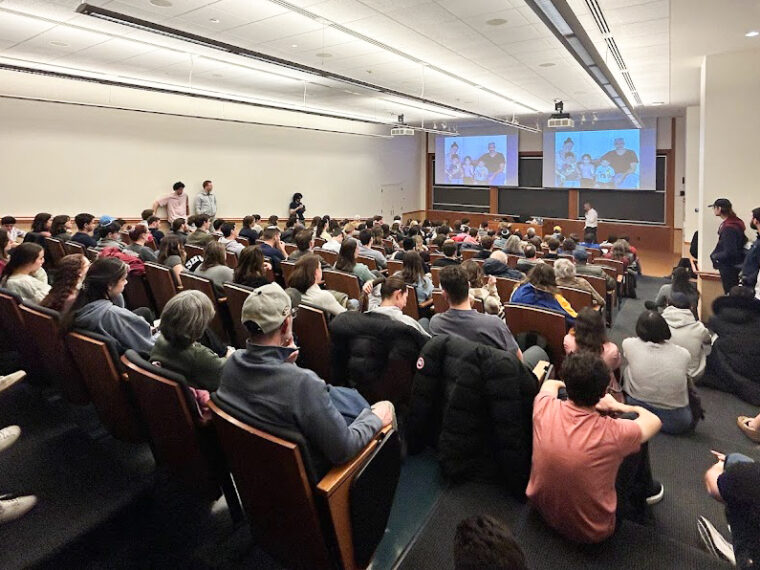News
Israeli survivor of Oct. 7 attacks tells his family’s story

Gal Cohen-Solal speaks to an audience about his experience on October 7th (Photo Courtesy of WashU Chabad)
Gal Cohen-Solal, an Israeli man who survived Hamas’ Oct. 7 attack on Kibbutz Re’im, spoke to community members about his family’s experience at an event hosted by Washington University Chabad, Feb. 19.
Cohen-Solal spoke as part of an organization called Faces of October Seventh that aims to bring firsthand accounts of Israeli people’s experiences in the Israel-Hamas war to U.S. college campuses. After sharing his family’s story, he and the event’s organizers discussed the purpose of sharing firsthand stories and answered audience questions.
Cohen-Solal said he, his wife and children lived in Kibbutz Re’im, a neighborhood in Southern Israel near the Gaza Strip. Kibbutz Re’im is less than a mile away from where the Nova Music Festival was held, where Hamas militants killed at least 260 attendees.
He showed video footage of Hamas members entering his neighborhood on Oct. 7 and presented a timeline of the following 30 hours that he spent with his family in their home’s safe room.
“We were waiting for our death,” Cohen-Solal said.
He recounted his young children’s experiences being in the safe room with little food or water and spoke about how one of his children was too young to understand the need for silence.
“I put my hands on his mouth,” Cohen-Solal said. “Every ten or fifteen seconds I took my hands off [so] he could breathe. It was a terrifying moment.”
Cohen-Solal said that he knew several people who died in Israel on Oct. 7 and in the conflict since then. He dedicated the speech to a man he described as a mentor from his time serving in the Israeli Defense Force (IDF) and a family member, both of whom have died in the Israel-Hamas war.
After recounting his story, Cohen-Solal answered audience members’ questions. The event’s organizers asked that people not ask political questions, but rather focus on Cohen-Solal’s individual story.
One audience member asked Cohen-Solal why he wanted to travel to share his story as opposed to staying in Israel. He said that he wants to share his story because he thinks people might spread misinformation in the future about the Israel-Hamas conflict.
“I am very afraid that one day people might say Oct. 7 never happened,” he said. “I’m here to say that it did happen and that it was even worse than what people think.”
Eden Yair, the Israel Fellow at Chabad, said that she thinks bringing Cohen-Solal to campus is important because most people only hear about the Israel-Hamas war on social media or in the news.
“We know the story,” Yair said. “People in America know the story from Instagram, TikTok, and journalism. To hear from him firsthand is way more powerful.”
Junior Lea Vilna-Santos attended the event and said that listening to a personal account of the Israel-Hamas conflict was difficult, but that she thought it was important to hear.
“It’s super impactful to hear from someone who’s there personally,” Vilna-Santos said. “It feels so far away but with this [speech] it’s right here.”
She also said that the religious and political tensions surrounding Israel and Palestine make it harder for people to grapple with the loss of life and other topics discussed in Cohen-Sohal’s speech.
“There’s a lot of info going around about what’s happening,” Vilna-Santos said. “The most important thing is just to listen to everything.”
